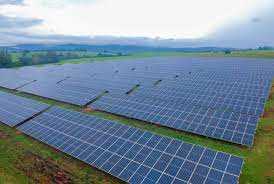
The Environment - Tanganda Holdings is brewing a cup of optimism by taking a proactive approach to ensuring the long-term sustainability of its tea industry through the intentional reintroduction of irrigation-powered sustainable power generated by green energy.
The company has secured a sustainable power supply from its own solar power plant, ensuring a consistent source of energy to run irrigation systems. Previously, the company used electricity and generators for irrigation a situation which became unfeasible due to high maintenance and operational costs.
Currently, Tanganda has invested in green energy and has continued on that path by installing three independent battery-supported solar energy plants on three of its five estates, with a total maximum production capacity of 4.4 MW: Ratelshoek 1.8MW, Jersey 1.4MW, and Tingamira 1.2MW. With such capacity, the company believes it is a viable alternative to reinstate irrigation in tea production since a stable power source ensures that irrigation systems work consistently, avoiding crop disruption.
Tanganda CEO, Timothy Fennell, said on the sidelines of the company AGM: “As we now have some big solar projects and we now have the power at an affordable rate, we are planning to re-introduce irrigation into the tea production. Using Zesa and a generator, tea production was not viable, but using solar power, the whole system changed and now is viable.”
Related Stories
The irrigation project is still ongoing, as the company has spent millions of dollars on irrigation, including dams, reservoirs, and pumps. Tanganda has invested US$4 million in irrigation over the last two to three years, with a heavy investment of almost USD$8 million being channelled towards solar power.
Tea cultivation requires continuous and timely irrigation to achieve optimal growth and yield, and solar power ensures a steady flow of electricity for irrigation. Consistent water supply is essential for growing tea crops, particularly during dry spells. Tanganda can reduce the impact of droughts and maintain constant tea output by having a reliable power source.
The adoption of solar energy promotes long-term sustainability. It is a cleaner and more environmentally friendly alternative to fossil fuels, considerably lowering Tanganda’s carbon footprint.


















Leave Comments